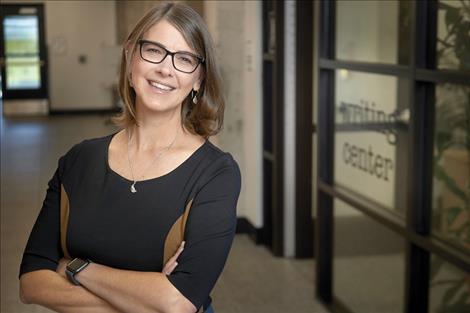Writing center director to examine relational value of writing in an AI world
Hey savvy news reader! Thanks for choosing local.
You are now reading
1 of 3 free articles.
BOZEMAN – Language is a meaning-making tool, one that educates and informs, persuades and dissuades, connects and divides. At Montana State University, Michelle Miley has devoted her career to ensuring that students develop the skills to use that tool, along with an understanding that the writing process itself can forge connections between people with vastly different viewpoints.
As director of the MSU Writing Center and associate dean in the College of Letters and Science, Miley believes writing skills are essential in society and that they will remain so, even as generative artificial intelligence platforms that can emulate human writing, like ChatGPT, gain wider usage.
Miley will address those issues and the role writing centers play in helping students find their voices — in addition to the courage to use them — in the third installment of MSU’s 11th annual Provost’s Distinguished Lecturer Series at 7 p.m. Nov. 14 in the Hager Auditorium at the Museum of the Rockies. All events in the lecture series are free and open to the public and are followed by a reception in the museum lobby.
Miley’s lecture, “We Write for the We: Learning from Writing Centers in a World of AI,” will describe the guiding principles she has put in place in the Writing Center since she became its director in 2013. At locations in Romney and Wilson halls and the MSU Library, the center is staffed by undergraduate and graduate students who provide one-on-one tutoring and offer writing groups and workshops that complement and support classroom instruction. Through the center’s various models, tutors supported MSU students with their writing over 8,000 times during the last academic year. In addition to course assignments, they also provided help with resumes, cover letters and personal statements for graduate school or other applications.
But the center isn’t just a place for students to seek assistance with specific projects. Miley describes it as a co-learning environment, where the student tutors develop their own leadership and communication skills while helping their peers do the same.
“For me, this is a pretty special place on campus – a learning environment for our tutors, our students and our faculty,” Miley said.
To create such a place, Miley has drawn from her own and others’ research supporting the premise that writing is a relational activity connecting readers and writers. As director of the Writing Center, she works to ensure that the environment is structured to promote a reciprocal exchange of ideas.
“Writing centers have been thought of as ‘homey’ spots,” she said. “In my work here, I think of home as a place of nurture and growth, a place of safety to figure out ideas. I envision myself creating a place where students feel secure and that they belong enough to do that.”
Generative AI is a topic that comes up more and more often these days, Miley said, adding that she is constantly being asked whether, with such tools available, people will even need to develop writing skills in the future.
“Some people think it’s apocalyptic, while others are thinking, ‘Wow!’ The truth is somewhere in the middle,” she said.
At the Writing Center, Miley said, the goal is to teach students how to use generative AI and do so ethically.
“We can think of generative AI as a tool to become more aware of why we write and the ways we think about scholarship,” she said.
Miley will share with the lecture audience her belief that human-generated writing will endure for many reasons, not least of which is our innate desire to form meaningful relationships. That goes back to her conviction that writing is, at its core, a relational, social activity.
















